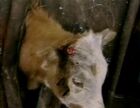Questions about life should be a very personal thing.
First of all, this is a discussion of whether people have exclusive rights to suffer and should not suffer, so all forms of speciesism are meaningless in this discussion (the purpose of the discussion is to find out whether speciesism is reasonable).
[Example, one of the forms of speciesism: if you don't kill animals, why kill plants? Think of it this way: Vegan thinking is essentially questioning the clear line between humans and animals. They also draw a line according to their own thinking, but this line is generally between animals and plants (there is nothing wrong with the act of drawing a line (otherwise it really becomes the Buddhist so-called abandoning all attachments, but I don’t think this has anything to do with it). meaning), the question is always where to draw the line). The rebuttal of "why kill plants if you don't kill animals" actually implies a special dividing line at the foundation: one is human, and the other is everything else - if it crosses human beings, it should go all the way to plants, to stones; Everything is the same under man. There may be no problem with this thought in itself. But it does not apply in this argument. Because it is the specificity of this boundary that vegans question, its plausibility is the focus of the discussion. So carnivores cannot use it as the basic fact of an argument, and must justify this foundation (that particular limit) in other ways. (Using it directly, you're actually saying: If I'm right, then you must be wrong. And this proposition can't be wrong - because if we think differently then they can't be the same. But right This proposition does not justify the rational superiority of meat.)]
Nature:
The question of meat versus vegetarianism is an ethical one. Ethical questions are questions of value, and all questions of value are about basic sense-data (what you feel most directly, like light, touch, sexuality, pleasure of any kind, and pain); if the feeling between two individuals If the materials are different, it is impossible for them to reach an agreement. For example: If I am red-green colorblind, then a painting that is beautiful to you is worthless to me. Both ideas are true. There can also be multiple truths in the meat-vs-vegetarian debate.
(So, what is truth? A truth is a perfect inductive system that does not contradict itself and agrees with what has been observed in the past and should be observed in the future. The theory of relativity is an approximate truth. It is stronger than Newtonian mechanics Closer. Quantum mechanics is another aspect of approximate truth that is perhaps as close to truth as relativity. The unrealized grand unified theory is a higher level of truth because it will resolve the contradiction between relativity and quantum mechanics . Astute readers will realize that complete truth is unattainable. The fundamental reason for this is that the fundamental dependence of human knowledge (including truth) is induction (the remaining two cognitive means (inference and deduction) must rely on induction to generation), and induction is not guaranteed to be 100% accurate - why did the sun rise every day in the past and it will rise tomorrow? Nor can Einstein guarantee you that the sun will rise tomorrow (Interlude: But a poet can). So what is truth? Absorb the facts, get rid of self-contradiction, and then believe that you have reached the truth. Then it is supreme beauty.)
Morality is beauty itself. Human moral standards are meaningless in the discussion of this issue. One must find one's own morality.
[There are some words in the world that are generally true, and some words that are generally false. Falsehoods conflict with themselves, so they are false; or they are different from what you (an identity worth thinking about) see. But there are still a lot of words left, which can only be half true. If you believe it is true, it is true; if you believe it is false, it is false. Trust what you know. This is an aesthetic question. Wittgenstein said that aesthetics and ethics are unified. 】
So all I have to say here is conflict. I don't have the truth. Or that I only hold my own truth. I am an analyst. Before the analysis begins, there is one thing to confirm - logic. Of course, one can choose to think illogically; there is absolutely no problem with that. Poetry is very illogical at times; love has no logic (of course, sometimes what seems illogical is actually super-logical, which occurs in art, as a trade-off, rhythm; philosophy also needs but as little as possible). But the topic, while I'm trying to make it literary, is philosophical in nature - it's about logic. So the foundation is logic. It's the only thing we have to both agree on at this time (of course, you can disagree, then this article will be worthless to you (it doesn't matter)). It's all said and done. the following
Argument one:
Animals are babies when it comes to suffering. So if animals can be killed, babies can be killed. An conceivable objection is that babies will grow into humans in the future, which is actually different from animals. This view can be objected as follows: the person the baby will grow up to be does not actually exist. This amounts to a problem with the Ship of Theseus. A ship has been replaced with wooden boards again and again. In the end, all the wooden boards on its body are no longer the original wooden boards. So is this ship still the original one? The answer is that if there is an ongoing, excessive process where the ship is finally fully refurbished after one repair, then the individual identity is maintained and we can say that the two ships are one. But in the case of babies, this process does not exist. This process takes place in the future and belongs to the realm of possibility. The realm of possibility has the following problems: if it is considered reasonable to consider the interests of a non-existent human being, then one must consider the fate of the fertilized egg, then abortion is unacceptable (the fetus will grow into a human being), the use of contraception Condoms are unacceptable, even jerking off and menstruating - one should suffer the guilt of killing hundreds of millions of people every time they watch porn. At this point, it doesn't really matter if the sperm and the egg are combined, because it's a part that can develop into a full person, just like a baby is a part that can develop into a full person (the mirror needs the egg, the baby needs the egg). Ideological Education). If you agree with the above, then if animals can be killed, babies can be killed.
Argument two:
Argument 2 can be drawn from an argument against vegetarianism: are plants free of pain? Let me give the answer I think first: yes. To fully answer this question, I am going to try to explain the nature of suffering. There is actually a huge commonality between animate and inanimate objects: they both accept the influence of another substance in the physical world, and then respond accordingly. For example, a grain of sand flies when it is blown by the wind; simple single-celled organisms are stimulated and respond at the same time, which is basically the same as inanimate bodies. This is still true in higher animals, that is, a response controlled by the spine. There is no difference in type between responses controlled by the brain and responses controlled by the spine, but only in degrees. Meaning, the actions made under the control of the brain can be seen as a spinal response over a long time span, dominated by memory (while giving higher organisms huge evolutionary space, utilitarianism is introduced because of future existence). Now, it seems possible to explain the nature of pain: there are two layers of pain, one instantaneous and one continuous (plants can be seen as possessing the first pain). Then I want to expand on the definition of pain: any emotion is pain, and biological life is a process of accumulating pain, responding to that pain, releasing that pain, and then producing another pain, and then releasing it again , such a cyclical process. For example, the accumulation of sexual desire is pain, and the pain is released when mating; the accumulation of hunger is pain, and the pain is released when eating; being beaten is the accumulation of enough pain in an instant, and running away is the release of pain; prolonged inactivity is also pain, and then get up To move is to release the pain.
Do unto others, do not impose on others. Actions that cause suffering to other individuals are considered inappropriate and immoral.
(An individual can never know another individual's pain. He can only draw patterns from experience, and then correlate the other's behavior with what he knows about his pain, so he can estimate the other individual's feelings, This makes the ability to empathize possible. This function is accurate enough for the same kind, but the farther the object is from the same kind, the less efficient the ability. I roughly think that in terms of pain, humans are The ability to understand other mammals with sufficient accuracy is lower in bugs and very low in plants. But this may not mean that plants have less pain than us, because the standard of measurement may be Not at all. Suffice it to say that in human society, there is less urgency to empathize with creatures that are farther from us.)
(Of course, sometimes you don't follow the rules you don't want. Like cheating. But the slaughterhouse itself is just not romantic enough for me)
There is enough basis already, I will make the following point, and then argue it:
The first layer of pain (vegetal) is perhaps unsympathetic.
Completely momentary pain doesn't care about oneself. Completely instantaneous things have no future, so there is no utility, and suffering means nothing to them. Anything in a moment is meaningless. Or there is an absolute meaning, and an absolute meaning does not require anything else. Just imagine the experience of an extreme, intense, pure orgasm in a good movie. In that moment, everything is meaningless. Creatures with only the first level of pain exist forever in that state (the first level of human suffering is sympathetic because it transforms into the second level of pain, not only the continuation of the pain in the body, but also the Experience the persistence of the spirit - a person with only the first level of pain will not have any emotions, no difference with a plant, logically speaking, people should not sympathize with him, we sympathize with this The only reason for a man is that he looks like a man, but it's just a shell, a cloak of deceit - and that's true of animals). If there is no accumulation process, there is no need to release. So the suffering of plants might be seen as equivalent to sand being blown by the wind, without sympathy or rescue.
(Even if sympathy for this pain is deemed necessary, that is, if we assume that plants are at all worthy of sympathy, the conclusion remains: Vegetarianism should be adhered to. Because a piece of meat requires eight times its mass of grass to produce—a cow is to eat Herbal. If the assumption is that the entire food chain should be sympathetic, then trying to eat organisms at the bottom of the food chain is obviously the most logical. Eight times is a huge amount and should be considered.)
This insight provides a rationale for the hierarchy of compassion: the less compassion can be given to creatures whose first pain occupies more of their overall pain. For example, in the face of an ant and a dog, we can have reasons to give different sympathy. But this seems to raise another question: Are human and animal suffering really the same? Don't humans have a higher level of suffering? In this case, what level of empathy should be for the remaining mammals? Or there is a counterargument: animals have no self-awareness, so they cannot be aware of their own pain - which is actually equivalent to the previous question, because self-awareness can be seen as a product of the overdeveloped second pain.
My opinion is that this objection is weaker, first because of the infant paradox (which may be enough); second, in terms of the response to pain, the remaining mammals and humans are close enough; and most importantly, For the pain of being killed or beaten, there is less need for a developmental level such as the second human suffering. While that could allow for more mental pain, it's more or less the same physically, and that's enough.
Argument three:
Also start with an objection: all suffering in the world remains the same. I haven't done a detailed investigation of this view yet, but an obvious counter-argument is that it leads to nihilism - people do everything the same and don't need to be responsible for their own results. This is clearly incorrect, and even if it were, it is not a solution, just an escape (this is Russell's argument against skepticism). Just think: a person is angry and sees a stray dog. At this time, he can choose to beat it to discourage him, or he can choose to go up and pet it, and it feels good. People are responsible for everything they do. Human behavior affects the world. (is deviating from philosophy)
Argument four:
Completely think "Why can you kill plants if you don't kill animals?". Essence: There is no such thing as "what should I feel" in the universe. You either feel it or you don't feel it. Feeling drives behavior. For example, guilt drives compensation. As ignorant human beings, we pursue the truth but have only the feelings that can be obtained according to the current stage of knowledge. This, although different for everyone, is absolutely true. I have no sympathy for any vegetables or fruits. It's been that way since childhood. But for kittens and puppies. Therefore, under the lifestyle of only eating vegetables and not meat, there is no contradiction between me and myself. On the other hand, if pity the cats and dogs on the street, but eat meat, it seems contradictory. (If the animals in the slaughterhouse died without worry and died instantly without pain, it seems to be another matter - I don't think animals think about death and then feel fear when they are alive - even, if there are no family members, I think so It is perfectly acceptable for any situation to happen to a human being - life is nothingness.) (What if there is sympathy for vegetables and fruits? - Accept your eternally painful fate.)
[Additional: The above can help solve the problem of abortion. In fact, the issue of abortion can only make substantial progress if the ethical issues of animals are resolved. The essence of abortion disputes is respect for life. But what is life? At what age should a baby be considered alive? What standard to use to measure? If it is said that a newborn baby is alive, and this life needs to be respected, is it contrary to "animal life does not need to be respected at all"? But if the last one is not available at all. Why was it just born? Why is fully developed as the standard? A dummy made by a scientist, without a brain, but otherwise fully functional (heartbeat, breathing), can be said to be alive and should be respected? How to define the development of the brain? self conscious? Why choose self-awareness as the threshold to be respected? If so, can a one-year-old be tortured at will (because not yet self-aware?)?
According to the above idea, respect for a baby starts with the generation of ta's fertilized eggs, and continues to grow with ta's development. So to what extent should an infant's life be fully respected? It's hard to say. I think this is one of those questions that is impossible to articulate. One theoretical approach would be to measure the intelligence levels of infants at various ages, restore them to animals, and then restore how we treat infants at different ages based on how we treat those animals. But I don't know how to measure it, and I don't know if I can measure it. I am not a scientist. 】
Jesus:
"Therefore I tell you: Do not worry about your life, what you will eat or drink, or your body, what you will wear. Isn't life better than food? You look at the birds of the sky, and neither sow nor reap nor store up in barns. The heavenly Father feeds it... You think: how the lily of the field grows; it neither labors nor spins, yet I tell you: even when Solomon was in his great glory, he was not as well dressed as this flower. Doo!
You little believers! The grass in the field is still there today, but it will be thrown into the furnace tomorrow, and God will give it such a decoration, not to mention you! So don't worry and say: 'What to eat? What to drink? what to wear? 'These are what the Gentiles ask for. Your heavenly Father knows all these things that you need. Seek first his kingdom and his Father, and all these things shall be added to you. So don't worry about tomorrow, because tomorrow has its own worries, and one day's troubles are enough for one day. "
how to measure a soul
Know what, whether to love.
Many souls cannot be measured. Questions about life should be a very personal thing.
View more about Earthlings reviews







